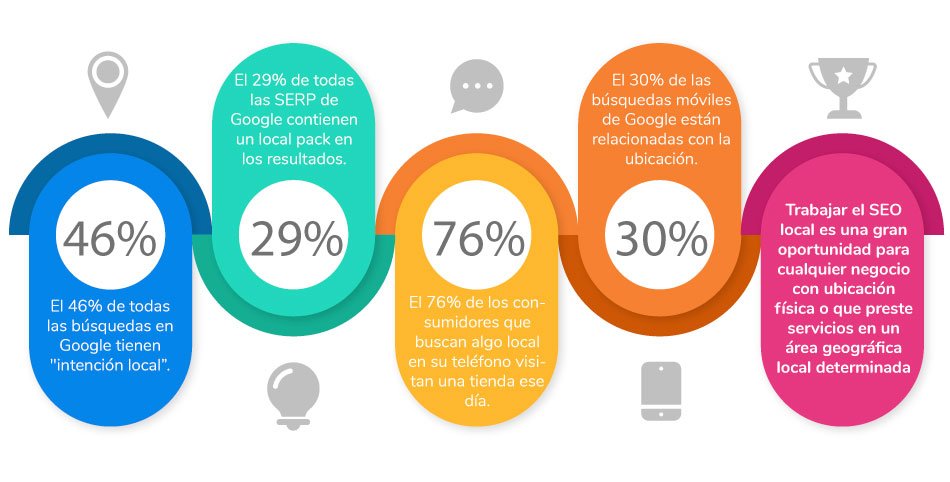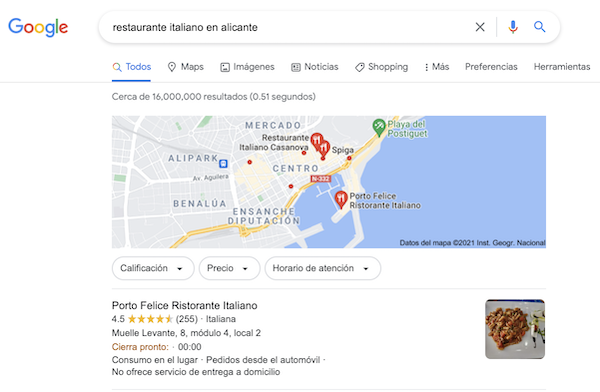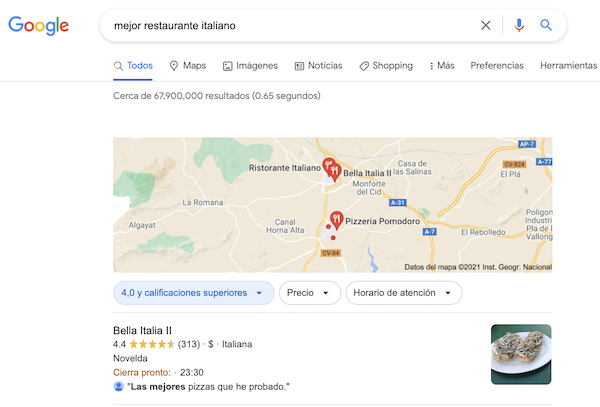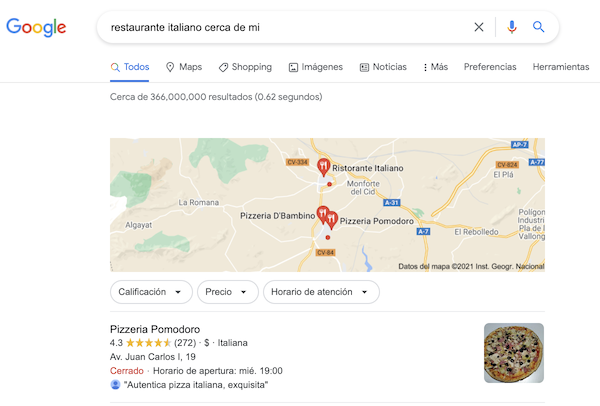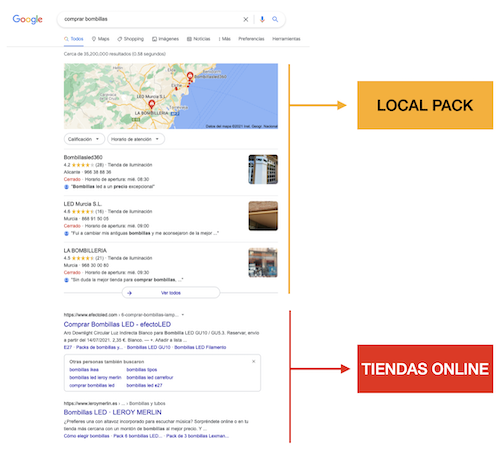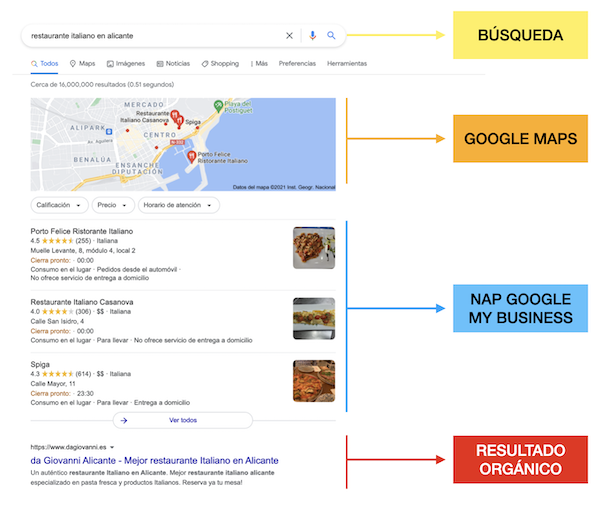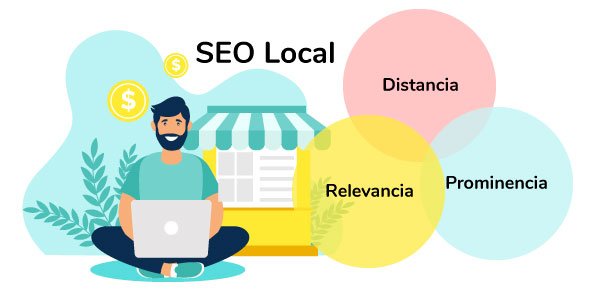Written by María Navarro
Índice
Something fundamental when planning an SEO positioning strategy is to know who the services or products offered by our clients are aimed at and where they are located.
When we focus on the location factor, local SEO, national SEO and international SEO come into play. Depending on the target customer, we will use one strategy or another.
In this article we are going to focus on what local SEO is, its importance and how to improve it.
What is local SEO?
Local SEO is a search engine optimization strategy focused on increasing the online visibility of a local business.
The objective is to appear in the first results of search engines when the user performs a geolocalized search or in a specific local area, especially when an intention such as “visit in person” is inferred from the search.
To achieve this goal we will work mainly on the optimization of our website, the Google MyBusiness profile, social networks, creating “NAP” appointments, among others.
Why is local SEO important?
Working local SEO is a great opportunity for local consumers interested in our products or services to find us. A good local positioning will help you stand out among the companies in your geographical area, providing advantages to your business such as the following:
- Attract more traffic from users close to your physical location.
- Increase online visibility.
- Opportunity for potential customers to choose us over our competitors.
- Attract more targeted traffic to purchase intent, which improves your chances of conversion.
- Improve credibility and build trust.
If you still don’t think local SEO is important, let’s talk data:
- 46% of all Google searches have “local intent”.
- 29% of all Google SERPs contain a local pack in the results.
- 76% of consumers who search for something local on their phone visit a store that same day.
- 30% of Google mobile searches are location-related.
Data from (Think With Google)
Therefore, local SEO is a must for any business you own:
- Physical location where you receive customers , for example: restaurants, grocery stores, veterinarians, hairdressers, bakeries, dentists, law firms…
- Any company providing services in a given local geographic area, such as plumbers, locksmiths, painters, masons, electricians…
Each and every one of these businesses live mainly from users who are close to them, so it is especially important to be well positioned and have a good online visibility.
How does local SEO work?
Search engines use the user’s location to return more useful results.
When the query is made from mobile devices, it is determined taking into account their geolocation. When that query is made from the desktop, they are based on the IP address.
When the user performs a query, Google displays different types of results in the SERP and shows us some elements or others depending on whether it considers the search to be “local” or not.
- Searches where the user adds a location to the search term, for example: “Italian restaurant in Alicante”, “plumber in Alicante”.
- Searches that do not include location but the term itself shows local intent, e.g. “best Italian restaurant”, “urgent plumber”.
- Searches where location is not specified but include terms that indirectly imply an intent where users want results nearby, for example: “Italian restaurant nearby” or “plumbers nearby”.
We must keep in mind that Google does not only show local results for keywords that contain a specific location. If Google considers that the search performed needs to be answered with a local result set, it will display them even if the keyword or search intent is not obviously local.
For example, for the term “buy light bulbs” which, a priori, could be done online, Google is not so clear about the purpose of the search and shows us first the local pack and then the organic results of online stores.
These local search results can be divided into three main opportunities:
- Local module (local pack):
- Results at the top with the map of locations extracted from Google Maps.
- NAP data (Name, Address, Phone) from Google My Business.
- Organic search results from our website.
How Google ranks your business for local searches
Local SEO works like a regular Google search. When a user performs a query, Google analyzes its index to provide the best results.
However, for local searches Google uses a different set of ranking factors, based on a combination of relevance, distance and prominence factors.
Factors for local positioning and how to improve them
Relevance
Does your website match the searches that the user performs?
Relevance indicates how well your local business profile matches the terms a user searches for.
Complete and detailed information about our company should be added to help Google understand what we do or what we offer so that it can display our listing in relevant searches.
We must be sure to use the keywords that our potential customers are looking for, describe our profession or business and what kind of products or services we offer, always with the same wording that our audience would use.
It is advisable to conduct keyword research to find out what terms our potential customers use when they search online for a service like the one we want to offer. For example: are you looking for more dentists, dentists…?
The more closely our profile matches what the user is looking for, the more likely Google will show us as a local result.
Prominence
How well known and valued are you?
In the offline world there has always been popularity: some people are better known and more popular than others, some businesses more than others…
If they speak well of us, recommend us and give us good references, we will be more popular, known and, therefore, we will be more successful.
With the prominence factor, Google tries to reflect this in the online world, so it looks for indicators that justify that our business or brand can be trusted, that we are real and also better than the rest of the competitors.
Brands that have a higher online prominence will be stronger and appear more credible and trustworthy to Google’s local algorithm, so they will have higher visibility in the results.
Google looks for these prominence indicators in the information it finds about our company:
- Information you obtain from our website.
- Google My Business score and number of reviews. This indicator directly influences local search rankings: the more positive reviews and ratings, the better a company’s local ranking.
- Position of our website in the organic results, therefore, we cannot forget to improve our portal and implement all possible recommendations to improve search engine optimization (SEO).
- Existence of active and verified social network profiles.
- External links from the local environment. For these links to give us prominence it is not necessary that they are dofollow or have a good domain authority: what Google looks for in them is to verify that you are a real business, that you are where you say you are and that other local businesses or institutions trust you.
It is important to keep in mind that if Google cannot find us or there are not enough signs of prominence, it is much less likely to rank us.
Distance
How far away are our potential customers?
Distance is a ranking factor unique to local SEO and arguably the most important factor.
As we have discussed throughout this article, when a user performs a local query, the algorithm tries to display the most relevant, proximate and quality result.
The distance is calculated according to the meters each potential company is located from the location terms used in a search. If a customer does not specify a location in their search, Google will calculate the distance based on what is known about the user’s location.
It is very important to show Google where our business is located so that it considers us in nearby search queries.
In summary, in order to rank better in Google local results, it is important to take into account:
- Location where the person is at the time of the consultation.
- User proximity.
- NAP Consistency (Name, Address, Phone).
- Local and industry keywords.
- Reviews.
- Positive evaluation of these reviews (quality/quantity).
- Google My Business company profile sheet.
- Google Maps star rating.
- Actions in social networks.
